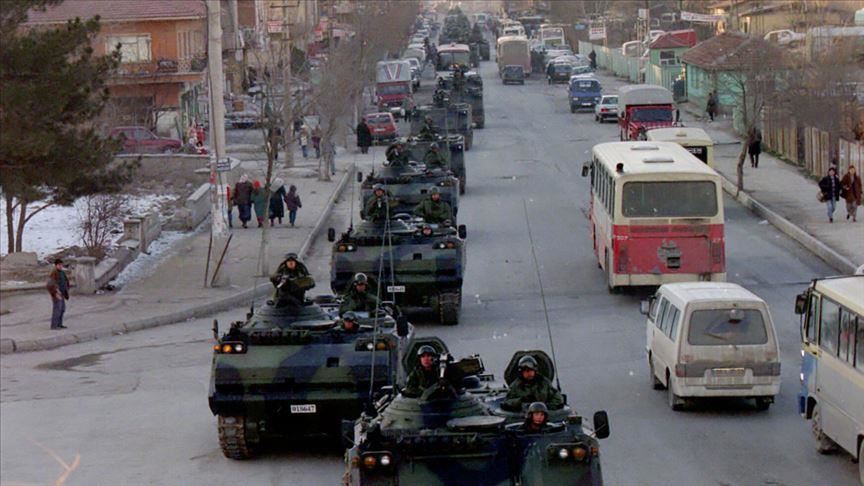
ANKARA
Turkey’s 1997 military coup put “a great deal of pressure on all institutions”, according to a professor who lost his job in the coup, which left people from all walks of life -- including students, academics and military officers -- deeply scarred.
“Feb. 28 [the day of the coup] came suddenly for us,” Mustafa Kemal San, a sociology professor at Sakarya University in northwestern Turkey, told Anadolu Agency.
"The feeling of fear that prevailed at the time silenced everyone. On Feb. 28, all institutions were under pressure. Those who managed to retain their posts considered themselves lucky. Some of my friends even stopped saying hello to me,” San recalled.
In February 1997, the military ended the administration of Prime Minister Necmettin Erbakan amid concerns by the generals about its alleged “Islamist” program.
Erbakan’s visit to Libya, his promotion of unity between members of the Developing-8 (D-8) bloc of nations, and his decision to host religious figures for a Ramadan Iftar dinner were among the reasons that led to pressure by the military, which accused the prime minister of engaging in “reactionary activities”.
The military expressed its dissatisfaction on Feb. 4 by holding a “military parade”, which included tanks, in the streets of Ankara’s Sincan district.
Following the parade, then-Deputy Chief of General Staff Cevik Bir said the event had been intended to “stabilize democracy”.
Mayor of Sincan, Bekir Yildiz, meanwhile, was dismissed from his post and arrested -- along with nine others -- after being accused by the military authorities of “inciting” the public.
Then-Deputy Prime Minister Tansu Ciller, a leading member of Turkey’s secular True Path party (a component of a governing coalition that also included Erbakan’s Welfare Party), conveyed her “concerns” to the prime minister, causing rifts to deepen between the coalition partners.
National security
On Feb. 28, Turkey’s National Security Council (NSC) held an emergency meeting that lasted almost nine hours, the longest-ever single session in the NSC’s history.
The meeting produced what would come to be known as the “February 28 Memorandum”, which contained a list of resolutions by the Turkish military taken in response to what it deemed “rising Islamist ideology”.
The military then forced Erbakan to sign a slew of decrees, including a ban on headscarves, the shutting down of Quran schools and the implementation of measures aimed at giving the military control over the news media.
Welfare Party outlawed
On June 18, the military went even further, forcing Erbakan’s entire government to resign, leaving the premiership in Ciller’s hands.
Then-President Suleyman Demirel, who was not a member of any party, then asked Mesut Yilmaz, leader of the liberal Motherland Party (ANAP), to draw up a new government.
In what has since been termed Turkey’s "postmodern" coup, a new government was then unveiled, which took the reins of power from Erbakan. The new government included ANAP, the Democratic Left Party (DSP), and the Democrat Turkey Party (DTP).
DSP leader Bulent Ecevit became deputy prime minister in the new administration, which was then used to enforce the NSC’s orders.
Private schools and foundations with suspected links to religious or conservative groups were shut, while devout Muslims were largely marginalized from public institutions -- including government agencies, state universities, the civil service, the judiciary and the military.
Erbakan’s Welfare Party was abolished based on a decision issued by Turkey’s Constitutional Court, while several politicians -- including Erbakan, Sevket Kazan, Ahmet Tekdal, Sevki Yilmaz, Hasan Huseyin Ceylan and Ibrahim Halil Celik – were banned from participating in politics for five years.
Coup masterminds punished
In a landmark decision in 2018, a Turkish court sentenced 21 high-level officials to life in prison for their roles in the 1997 coup.
These included former military chief Ismail Hakki Karadayi; his deputy, Cevik Bir; former First Army Commander Cetin Dogan; former NSC Secretary-General Ilhan Kilic; former Gendarmerie Commander Fevzi Turkeri; former Land Forces Commander Hikmet Koksal; and former Secretary-General of the General Staff Erol Ozkasnak.
Sixty-eight other suspects in the case were acquitted.
The court blamed Karadayi and Bir for "masterminding" the coup.
Many others who played roles in the coup have avoided arrest – due to old age or health problems – but have nevertheless been barred from leaving the country.
*Writing by Seda Sevencan, Sibel Morrow and Gozde Bayar
Anadolu Agency website contains only a portion of the news stories offered to subscribers in the AA News Broadcasting System (HAS), and in summarized form. Please contact us for subscription options.

